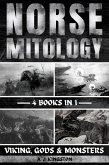The term 'Viking' is derived from the Old Norse vík, a bay, and means 'one who haunts a bay, creek or fjord.' In the 9th and 10th centuries it came to be used more especially of those warriors who left their homes in Scandinavia and made raids on the chief European countries. This is the narrow, and technically the only correct use of the term 'Viking,' but in such expressions as 'Viking civilisation,' 'the Viking age,' 'the Viking movement,' 'Viking influence,' the word has come to have a wider significance and is used as a concise and convenient term for describing the whole of the civilisation, activity and influence of the Scandinavian peoples, at a particular period in their history, and to apply the term 'Viking' in its narrower sense to these movements would be as misleading as to write an account of the age of Elizabeth and label it 'The Buccaneers.'
Bitte wählen Sie Ihr Anliegen aus.
Rechnungen
Retourenschein anfordern
Bestellstatus
Storno









